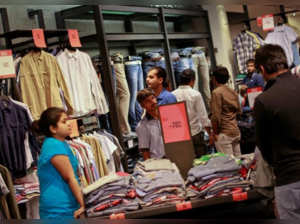 ETRetail
ETRetailHe visited the mall first to purchase a T-shirt, kurta and a dupatta. The subsequent trips were to exchange some of those.
Rather than frowning upon, Kumar was happy at his third outing to the shopping centre, as he was able to “fully utilise" the loyalty coupons at Reliance Trends, the anchor store of the complex which gave a discount of Rs 500 on a purchase of Rs 1,250 and above. "There is not much one can do here (Gaya) for entertainment," Kumar said.
Shoppers like Kumar are a bliss for Indian and global brands that are not only making heavy inroads into India’s hinterlands but also discovering a huge future growth market there, as consumers in small cities and towns are graduating from locally stitched clothes to ready-made branded fashion.
Retailers like Reliance Trends, Pantaloons, Aurelia, Lee, Wrangler and Levi’s say places like Gaya, Haldwani, Belagavi, Dehri-on-son, Muzaffarpur, Mangaluru, Trichi and Nashik are witnessing a shopping boom mainly fuelled by a combination of cheap mobile data, social media and ecommerce.
Retailers say they have seen the strength of the small-town India especially during the pandemic. While consumption in metros and other large cities has decreased and their overall revival is still only about 70% of the pre-Covid levels, small cities and towns are contributing a larger share to the overall revenue of brands.
For example, the denim brands of Lee and Wrangler are still grappling with a 65-75% recovery in large cities, but the rebound in towns is up to 95%.
“These (small) cities have much higher disposable incomes as compared to people in metro towns,” said Nitin Chhabra, chief executive of Ace Turtle, the India franchisee of the Lee and Wrangler brands. Half of the Lee and Wrangler stores are in small towns and they are generally profitable, Chhabra said. “Aspiration levels in smaller towns are the same as in the metros. Everybody is consuming the same online contents — same Google searching, same Instagramming and same YouTube watching. So, it is becoming one world.”
On top of that, thanks to lower rentals and manpower costs, stores outside the big cities are more profitable, fashion retailers said. Rents to percentage of sales are 35-40% in big cities, compared with about 10-15% in Tier-2 and -3 towns, Chhabra said.
"A lot of the IT service sector professionals are working from small town , moving the balance of spending and therefore boosting consumption here Disposable income has been reallocated to discretionary spends on fashion , footwear and beauty with people not travelling , holidaying or eating out so much. Marriages are a diminished affair. Part or most of that money is being spent in other avenues," said Sanjeev Mohanty, MD, South Asia, Middle East, North Africa, Levi Strauss & Co.
Put together, the growth rate in small-town India has exceeded pre-Covid times for many fashion retailers, and such places are emerging as a promising contender for the next phase of expansion.
"We have rapidly forged our presence to sub-1-lakh population strata towns, or taluka towns as we know them," said Akhilesh Prasad, CEO of Reliance Trends. "With work from home driving reverse migration into these towns, we have a set of consumers that have exposure of the best in fashion and expect the same in their home towns too."
As consumers in small-town India are warming up to branded apparels, fashion labels are tailoring their marketing specific to such markets. Brands offer more flexible exchange policies, tweaked loyalty programmes and cheaper assortment to even hiring local celebrities to pitch their products and keep the buzz going.
“Loyalty programmes work very well in smaller towns as it is still a novelty and value proposition, while a metro shopper will look for instant gratification,” said Sundeep Chugh, chief operating officer, Benetton. “If I am offering a 10% discount on, say, Rs 4,000 for a metro, I will offer the same for lesser value, say, Rs 2,000 for smaller towns.”
Of the 40 stores that Benetton plans to open, 70% are in tier-III and -IV towns.
“The small-town buyer does not buy out of impulse, it is like an investment decision for them. A personal touch like allowing them to exchange items even a day or two after the exchange date has lapsed is important for a small-town shopper,” said Lalit Agarwal, chairman of V-Mart Retail.
Read More News on
Download The Economic Times News App to get Daily Market Updates & Live Business News.
Read More News on
Download The Economic Times News App to get Daily Market Updates & Live Business News.









 Get Unlimited Access to The Economic Times
Get Unlimited Access to The Economic Times
